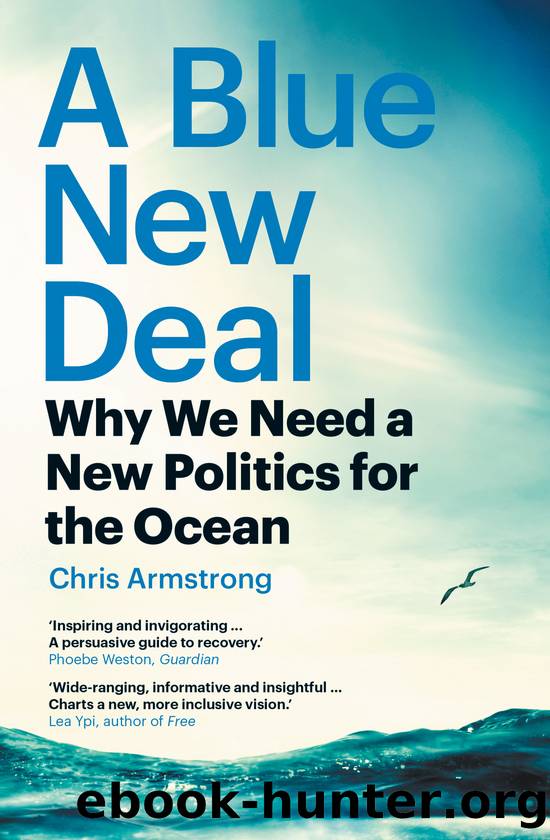A Blue New Deal by Chris Armstrong

Author:Chris Armstrong
Language: eng
Format: epub
ISBN: 9780300264999
Publisher: Yale University Press
7
THE RIGHTS OF MARINE ANIMALS
Humanity has brought over three-quarters of the worldâs land area into its own use during the past century, converting it into farms, factories and homes for a burgeoning population.1 In so doing we have radically shrunk the space available to other species. Activities such as hunting and pollution have also had a huge impact on those we share our world with. The consequences have been devastating. The large animals, or âmegafaunaâ, of many regions have already long since disappeared, and those that remain are often in a highly perilous state. If anything, these trends are accelerating: in the last four decades alone, wild animal populations have declined by an average of 60 per cent.2 In their place, the population of farmed animals has swelled enormously: 80 billion animals are now bred and slaughtered each year for human consumption.3 More and more of the worldâs remaining wilderness is being flattened to grow their fodder. Where there was forest, there is now concrete and tarmac. Where there were wild animals, there are caged animals, bred to be eaten.
As the land comes under ever greater pressure, we are turning our rapacious attention to the ocean instead. In fact, the fish taken from the sea already outnumber the animals we kill for food back on dry land.4 In some ways sea creatures are especially vulnerable, because they are largely unprotected by the (typically modest) animal welfare standards that apply back on dry land.5 Marine habitats are under pressure too: mangroves, wetlands and other habitats on the margins between land and sea are now being lost at unprecedented rates. Meanwhile the coral reefs are rapidly bleaching. These trends prompt some unsettling questions: will the sea be âtamedâ in the same way as the land? Will it become an Anthropocene Ocean, dedicated exclusively to meeting our hunger for food and resources? Will we see a wave of extinctions, with the remaining wild sea creatures leading precarious lives on the margins?
Many of us believe that the answers to each of those questions must be a resounding ânoâ. The ocean is first and foremost a habitat for a dazzling array of marine life, and it should remain a hospitable and bountiful environment for them long into the future. An account of ocean justice should be able to illuminate why this is such an important goal, rather than seeking merely to divide the spoils of the ocean fairly among humankind. That would be a seriously deficient and short-sighted approach. I will argue in this chapter that an important step towards ocean justice must be to take the rights of marine animals themselves seriously. Respecting and protecting their rights is important for its own sake, over and above anything marine animals might do for us. My goal will be to open up the conversation about what these rights might be, and how they might best be protected.
It is not necessarily the case that all marine animals have identical rights. That would depend on their specific capacities.
Download
This site does not store any files on its server. We only index and link to content provided by other sites. Please contact the content providers to delete copyright contents if any and email us, we'll remove relevant links or contents immediately.
The Lonely City by Olivia Laing(4796)
Animal Frequency by Melissa Alvarez(4457)
All Creatures Great and Small by James Herriot(4303)
Walking by Henry David Thoreau(3949)
Exit West by Mohsin Hamid(3820)
Origin Story: A Big History of Everything by David Christian(3679)
COSMOS by Carl Sagan(3616)
How to Read Water: Clues and Patterns from Puddles to the Sea (Natural Navigation) by Tristan Gooley(3454)
Hedgerow by John Wright(3348)
How to Read Nature by Tristan Gooley(3323)
The Inner Life of Animals by Peter Wohlleben(3302)
How to Do Nothing by Jenny Odell(3291)
Project Animal Farm: An Accidental Journey into the Secret World of Farming and the Truth About Our Food by Sonia Faruqi(3211)
Origin Story by David Christian(3191)
Water by Ian Miller(3174)
A Forest Journey by John Perlin(3062)
The Plant Messiah by Carlos Magdalena(2920)
A Wilder Time by William E. Glassley(2854)
Forests: A Very Short Introduction by Jaboury Ghazoul(2831)
